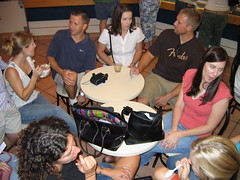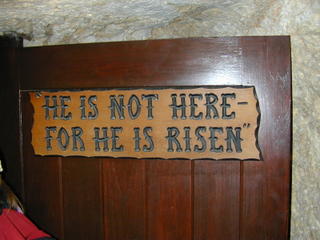One of the most important questions I’ve wrestled with since graduating from college is, “Who am I.” Trying to wrestle with one’s identity (or personal definition) is profoundly important. Without becoming morbidly introspective, and self-absorbed, how you answer the question of identity will have some influence on how you live. I believe most of us, in 21st century America suffer from a severe identity crisis. The problem is exacerbated by our use of language. For example, we phrase an ontological (being) question to children this way, “Johnny, what do you want to
be when you grow up?” Naturally, we all know that this question is not to be answered as it is asked. Little Johnny would be scolded if he answered, “A man.” Or “A person.” Or some other, literal answer (husband, father, son, etc). What we mean, by this question is functional (economic), i.e., “What would you like your occupation to be in adulthood?” Ok, Dan, now your splitting hairs like a typical theologian when we have more important issues to talk about! Before you cast stones, consider how many people go through “midlife crisis.” And consider what types of questions they are asking as they go through these traumatic mid-life experiences. Who am I? Why am I here? Why do I hate my job? Who are these strange people living in my house? Some, in rather desperate attempts to answer these questions, radically seek for a new definition. New job, new car, new family. All empty. The “What do you want to be” question reflects a confusion between who we are (being) and what we do. So, when answering questions about our identity, we include statements such as “I’m a nurse,” or “I’m a carpenter.” I would argue that this is probably due to modernity, the industrial revolution, and a secular mindset. Once God is removed from your world, there exists no meaningful reference point to answer the “Who am I” question. As we become more industrialized, the reference point for identity becomes the giant machine (our econonmy, business, etc). Then, when we become disabled, and can no longer function in the “cog” capacity, we loose all meaning. Not only that, but we can begin to see people in very utilitarian categories, loved or expended based upon their “usefulness” to society. Indeed, I hope you can see the tragedy.
So how do we properly answer the “who am I” question? As Christians, we have the correct answers. The reference point for our existence is God. Therefore the first answer is, “I’m a child of God.” Made in his image, I am different than all His other creatures. I am a new creature in Christ. I am a brother or sister to fellow believers. I am a son or daughter of my father and mother. I am a husband or wife, a parent or grandparent. My life is meaningful because I exist in relationship to God and my fellow creatures. Now, we have rightfully separated the question of occupation from the question of identity. So, if I become disabled, I can maintain a sense of meaningful existence. The answer of occupation used to be (Puritan era) referred to as “call.” So the question to little Johnny is not “What do you want to be,” but “What is your calling?” You see how God-centered that question is? The question assumes a sovereign who will employ you in His world as he chooses. If you suffer an accident, no need to worry, because your personhood is not wrapped up in your call. Your call changes, and you continue to exist. If you think that question is too “churchy,” at least ask, “What would you like
to do when you grow up.” Let’s get back to defining ourselves by our relationship to God and to others instead of by our jobs or performance.




